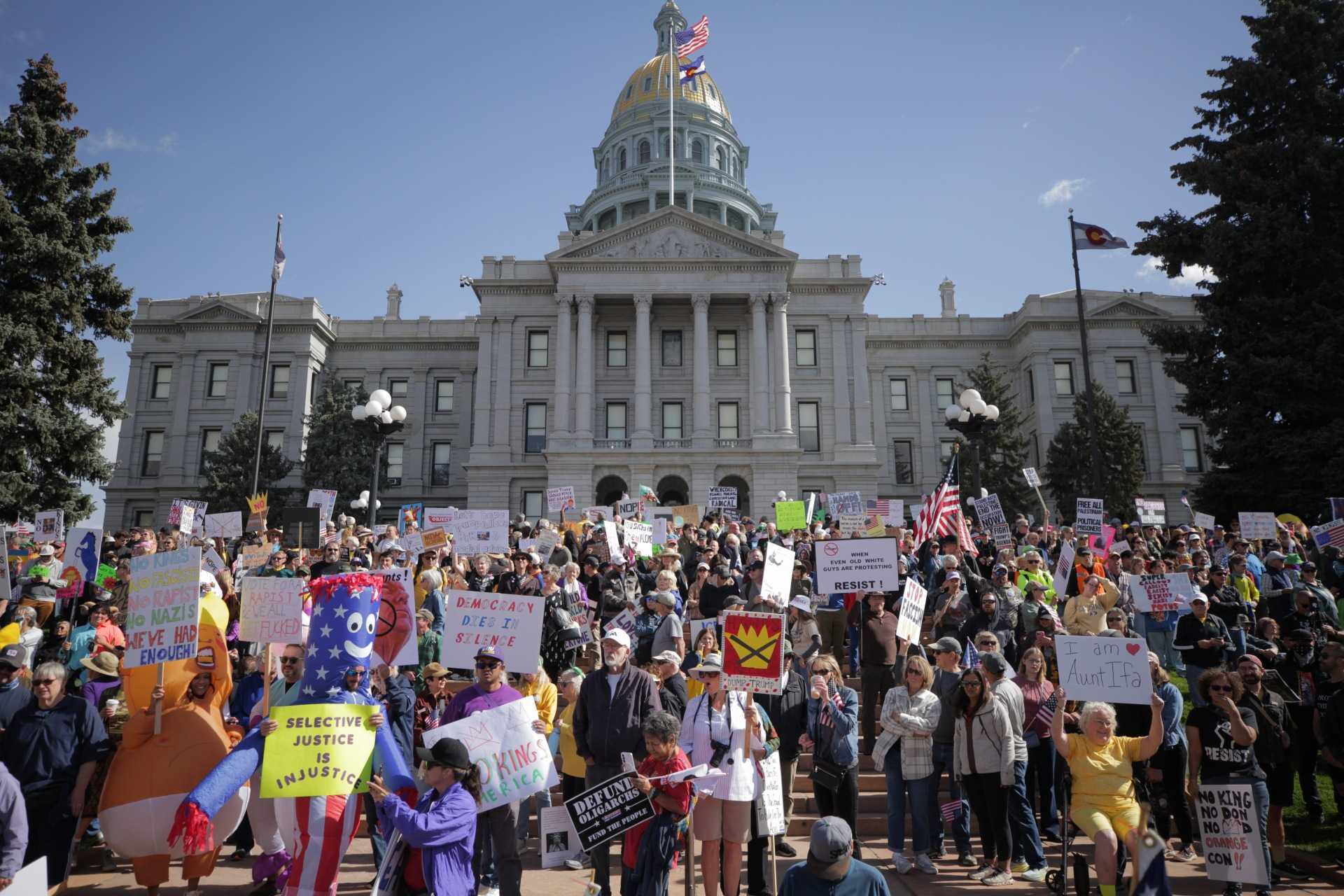
Gov. John Hickenlooper said he is in of support raising the age for purchase of assault weapons and allowing judges to issue temporary restraining orders to keep people from having guns if there’s reason to believe they might pose a danger.
Last week, after students across the country walked out of class in the wake of the Florida school shootings, Hickenlooper tweeted “Colorado has taken steps on guns and we need to do more.” On Tuesday, he told Colorado Matters that politicians who fail to act in the current environment risk their careers.
“The kids, right, when they get out there and they begin organizing themselves — and they don’t have professional PR teams, and they’re doing this all on Snapchat and Instagram —they’re going to be a powerful voice and we as adults can listen to their logic or we can turn our backs to it. But I think people, especially elected officials, will be turning their backs at their own risk.”
Under a proposal known as the the “red-flag warning,” family members or members of law enforcement could ask a judge for a temporary restraining order to keep a person from having a gun if he or she was believed to pose a danger. The measure, proposed by an advocacy group known as Colorado Ceasefire, says there is no bill to announce yet.
That reflects longstanding caution by lawmakers who worry about the political consequences of enacting gun legislation, the governor pointed out. In 2013, two Democrats were recalled and a third resigned after a package of gun laws was approved in the wake of the Aurora theater shootings.
He rejected the idea that issuing temporary restraining orders amounts to limiting gun ownership. The orders wouldn’t be permanent, he said.
“I understand there’s all sorts of difficult territory here for everybody, but the bottom line is you’re dealing with people who are having a mental health emergency and are clearly a danger to themselves and others and you’re saying that person shouldn’t have a gun at this time.”
Elsewhere in the interview, Hickenlooper stuck with his earlier calls for a tax increase for transportation and other projects, despite a rosy new state revenue forecast. Republican legislative leaders have opposed a tax increase, saying they’d use existing revenue to issue bonds for the work. For his part, the governor said the state can’t rely on a one-time windfall, but the new money could reduce the size of any tax hike.
“I think you go to the voters and say ‘alright, here’s how much we were going to ask you for and we don’t have to ask you for that much any more.’ ”
The governor also downplayed his interest in a possible presidential candidacy, despite recently having told ABC’s “This Week,” he is a “maybe” on the idea. The Denver Post has also quoted several of Hickenlooper’s friends and supporters as saying he is taking early steps toward a campaign. He said a possible meeting with former Secretary of State Colin Powell, first reported by the Post, was simply a suggestion by a mutual friend. A planned trip to Iowa is to discuss policy with the state’s Republican governor.
“I doubt there’ll be a Democrat in the room,” Hickenlooper quipped.
Interview Highlights With Gov. John Hickenlooper
On Colorado's bid for Amazon's second headquarters:
“I can tell you this, they [Amazon] never once talked about incentives or, you know, ‘we need more of this or more of that.’ ”
On sexual harassment allegations at the statehouse:
“What’s important is that the legislature has to find a framework and define boundaries of people’s conduct. When people go over the line here’s what the consequences are. And I don’t think it should be you cross one line and then you’re asked to resign or you’re expelled. I think traditionally in human behavior there’s gradations.”
Read The Transcript:
Ryan Warner: This is Colorado Matters from CPR News. I'm Ryan Warner. School shootings were already top-of-mind as we prepared for our regular interview with Gov. John Hickenlooper. Then another one happened, just before we sat down together on Tuesday. This time at a school in Maryland. What I most wanted to know is what he meant in a recent Tweet: "Colorado has taken steps on guns AND WE NEED TO DO MORE." I asked: What more? Gov. John Hickenlooper: Well, I think that things like bump stocks have no place anywhere and the fact that we killed the bill yesterday in the general assembly bothers me and I think that we need to publicize that stuff. The kids, when they get out there and they begin organizing themselves, and they don't have professional PR teams, and they're doing this on Snapchat and Instagram, they're going to be a powerful voice. We as adults can listen to their logic or we can turn our backs to it. But I think people, especially elected officials, will be turning their backs at their own risk. RW: So, you think ... JH: By that, I do not mean in any way a threat. I just think politically, they will suffer consequences. RW: I'll say that the City and County of Denver banned bump stocks, had a program to take them in if people had them. None so far as we know have been returned. What difference do you think a bump stock ban would make? There are plenty of people who say, sure, you can ban guns, parts of guns, kinds of guns. But fundamentally, if someone is hell-bent on killing, they're not going to respect a law like that. JH: Again, any one thing you do is not going to be a total solution. But look at the red flag issue. We're still discussing that here in Colorado. RW: So this is the idea of something of a temporary restraining order that would stop someone from having a gun if a judge declares that they are mentally unfit for a period of time. JH: If someone's having a psychiatric episode, for lack of a better word. I understand there's all kinds of difficult territory here for everybody. But the bottom line is you're dealing with people who are having a mental health emergency and are clearly a danger to themselves and others and you're saying that person shouldn't have a gun at this time. RW: It doesn't seem like the appetite is there legislatively. JH: Again, there is long history of why in politics people, elected officials, are cautious. In other words, we've seen in Colorado after we passed universal background checks, hard to argue that that's in any way taking guns away from people. I think the first thing is the Democrats should say at the beginning of every conversation, "We're not trying to take your guns away. We're trying to make sure our kids aren't terrified when they go to school." RW: Your son, Teddy, is in high school. I wonder, first off, if he participated in the walkout. JH: You'd have to ask him. RW: Did you talk to him about it? JH: Well, I did but I don't report on Teddy's, our conversations, to the media. RW: Let me ask this. As a parent, do you worry about his safety in the classroom? JH: Absolutely. Again, that is a major change from everything we've ever known. The parents are concerned about kids' safety. Kids' are concerned the kids' safety in schools. How are kids going to focus, and concentrate, and learn what they need to learn in school if they're worried about their own safety? RW: Is there anything you'd add to more, we should do more? JH: Raising the age for purchasing assault weapons is not a bad idea, I don't think. RW: Would that apply to the AR-15 that's been used in many of these shootings, is that what you're saying? JH: Yeah, exactly. Those types of common sense measures are not trying to take people's guns away. Most of the killers in these school killings are male. When we see young high school age or recently out of high school age kids, that's what makes a lot of people think that the age should be raised. RW: You say Democrats should follow the message "we're not taking your guns away" and yet people might say, "You are taking a gun away from someone who's under that age limit or preventing them from getting one. You're taking away perhaps a tool in the bump stock. You're taking a gun away from someone who might have a mental issue to some extent, isn't that taking a gun away? JH: From one individual who shouldn't have a gun? I think in this country, going back almost 100 years, we've agreed that certain weapons are not appropriate for defending your home. RW: Will you be marching Saturday in the March for Our Lives that will be happening in several Colorado cities and across the country? JH: We've got conflicting schedules so I don't know. This weekend's schedule is not confirmed yet. RW: Oh right. On to your political future, there's been talk for years that you might run for president and we've talked about it at this table often. You used to scoff a little at the notion, but on a national talk show recently you said you were a maybe. The Denver Post reports you're going to Iowa next month and says you're looking to meet with former Secretary of State, Colin Powell, let's hone in on Powell for a second. Are you looking to bone up on foreign policy there? JH: No, Colin Powell is somebody who I have always admired and I was talking to friends of mine up in Aspen who are old friends with Colin Powell and I was describing some of what we're doing here in Colorado and they said, "Would you ever be interested in meeting Colin Powell, General Powell? He might have an interest in just what you're talking about." And I said, "Ha. Are you kidding me? Of course." RW: The trip to Iowa is to talk education policy. JH: No, no, the trip to ... Well, it's to talk about what they're calling Future Iowa. It is the invitation of the Republican governor of Iowa, I'm not sure there will be a Democrat in the room. If I was going to Iowa, I would extend the stay. If that was the real purpose, I'd stay over a day- RW: That is if the purpose were presidential. JH: Exactly. If the purpose were presidential, I would try to get in front of as many Democrats. I might do a little tour out in some of the, Cedar Rapids, some of the smaller cities. RW: None of that planned. JH: None of that planned. RW: A check in on a big business story looming out there. Amazon's search for a second corporate headquarters. Metro Denver is one of 20 finalists. A team from the company visited in February. We understand you met with them. What can you say about the tenor of that meeting and maybe where your head's at right now on landing that? JH: Well, you know it was interesting. I'm not sure I'm supposed to be talking about it, but… RW: All the more reason to continue talking. What the heck? JH: We spent most of the time talking about public-private partnerships and how businesses could be part of the solution instead of a problem. I can say this, they never once talked about incentives or we need more of this or more of that. Honest to goodness, never came up. RW: What was an issue that came up that you'd like that kind of alliance to take on? JH: Well, things like traffic congestion. Things like affordable housing. They believe that they're going to be disruptive, non-conventional innovations. Whether it's autonomous vehicles in terms of traffic, a new way of building affordable housing using technology to more rapidly construct less expensive buildings that are higher quality. I think what they were saying was they want to be part of the solution. RW: This obviously connects to transportation and on that subject, I want to say the state budget is coming into focus. A new revenue forecast predicts the state will have roughly $500 million more to spend over the next two years and you've said that extra money should go to transportation and education. Transportation's where there's a difference between you and Republicans in the legislature. They want to use the extra money to fund bonds. You called earlier this year for a tax hike. Now that there's this extra money, does Colorado still need a tax increase? Does that change the picture or the equation for you? JH: Well I look at a surplus like what we've seen, which is a good thing, right? I mean Coloradans have worked hard to create this strong economy that allows you to have these choices and I always draw the distinction between which of these revenues are one time only revenues that come into the state, like if a lot of people sell their appreciated stock. Often times, that's just one time. It happens every few years. You can't really protect it- RW: You're asking, "Is the extra money sustainable, or is it one time?" JH: Right. Is it going to happen every year? So, we are very cautious on this. RW: So I think I hear you saying it hasn't changed the equation on your desire for a tax increase. JH: If we really want to deal with the problems that have come with our economic growth, I think we probably do need to have some new revenues. RW: Does this make the sell harder though, to voters, when they see "Surplus". JH: No. I think you go to the voters and say, "Alright. Here's how much we're going to ask you for. And we don't have to ask you for that much anymore. We could ask you for a lot less. And here's what we think we could ...". In the end, it's, "Here's what we're going to provide and here's what it's going to cost you." It's no different than going into a department store. RW: So this might shrink the size of the request. JH: Absolutely. I think without question the fact that the state has done better allows us to entertain that perspective. But is it big enough to really fix I25 and I70 and some of the other things? Probably not. RW: To an issue that dominated the early days of this session, and yet persists now. Allegations of sexual harassment by state lawmakers. The house expelled Democrat Steve Lebsock of Thornton. Formal accusations have been made against three Republican Senators and just this week, a Democratic Senator. GOP leaders in the Senate argue that lawmakers should only be expelled for sexual harassment if they're found guilty of criminal conduct. But you hear Democrats in the House say that standard is too strict. Do you think Rep. Lebsock's expulsion, do you think that was appropriate? JH: What's important is that the legislature has to find a framework and define boundaries of people's conduct. When people go over the line, here's what the consequences are. And I don't think it should be, "You cross one line and then you're asked to resign. Or you're expelled." I think they're, traditionally in human behavior, there's gradations of, this is what the consequences for this offense. You do this more serious offense, this is a greater consequence. You go this far and you should be expelled. RW: Do you think there was due process, enough due process for Rep. Lebsock? JH: Again, I'm not a judge and I'm not a lawyer. But from my perspective, yes, it seemed like they did a full investigation. There were so many people that were assailing him and saying that this is what he did to them, that these were the sexual harassment cases, the incidents. He to my knowledge never apologized, but in many cases attacked and diminished the people filing the complaints. Almost every business sets standards of conduct in their place of business. And- RW: You don't think those are clear enough for the legislature, it sounds like. JH: Well, I think they've become a lot clearer. And I think they're going to become clearer yet. Right. This is a consequence of decades of misbehavior. And people accommodating and in many cases, egregious, unacceptable behavior. Women, when they make these complaints, should not be attacked. They should not be assailed. They deserve to be heard fairly. I'm not saying that the allegations shouldn't be questioned or examined, but I think that if we're going to really transform workplaces so that women feel safe and feel free to participate, which clearly wasn't happening, then there's going to have to be boundaries. There are going to have to be a set of standards of conduct. RW: Across Civic Center Park, at the City County Building, Denver Mayor Michael Hancock also faces allegations from a former aide who says he sent her inappropriate text messages. Denver's Channel 7, which broke that story asked you for comment. They reported that you said, "Current laws", I'm quoting here, "probably aren't sufficient to what people, the public really expects now." How do you think expectations have changed? JH: Well, I don't think I said current law, but be that as it may, what before, was behavior that people didn't approve of, they put up with it. People now, are going to hold themselves to a higher standard, and say, "That kind of behavior has no place in our place of employment." And I think that's going to be as true in business, as it is in government. And certainly with Mayor Hancock, he gave a heartfelt apology. It was six years ago, I haven't heard of other allegations coming up. That seems different than say, Rep. Lebsock. RW: In political circles, there's the added layer of partisanship and politicking. And it makes me wonder as you look at this session, at the state capital, if this has resulted in less productivity, more partisanship, some issues going unaddressed. What is your sense about the effect this has had on the legislature? JH: Well it's certainly been a distraction. I don't think anyone can deny that. However, if you look at the number of bipartisan difficult bills that have gotten passed, this has been a bumper crop. In other words, there's been a level of bipartisanship as high as all eight years I've been here. RW: Where do you see that? JH: Oh my gosh, yesterday we just passed a broadband bill that's going to generate somewhere between $125 and $150 million, so that we can realistically in the next few years, see every single town, every single community in the state of Colorado, having high speed internet connection. RW: I wonder how this might affect a huge debate around PERA. This is the Public Employees Retirement. More than 500,000 past and present government employees rely on it, and estimates are PERA needs anywhere from $32 to $50 billion to meet its obligations. A bipartisan bill's been introduced, but controversial and complicated for sure in an election year. Do you hold out hope that there will be a PERA solution this session? JH: This is, one of the most vexing problems in this building, and it's been that way for decades. And part of it is, there are such deeply entrenched self-interests, and I think what's a real resolution here is going to require true bipartisanship. RW: Governor, thank you for being with us. JH: It was my pleasure. |








